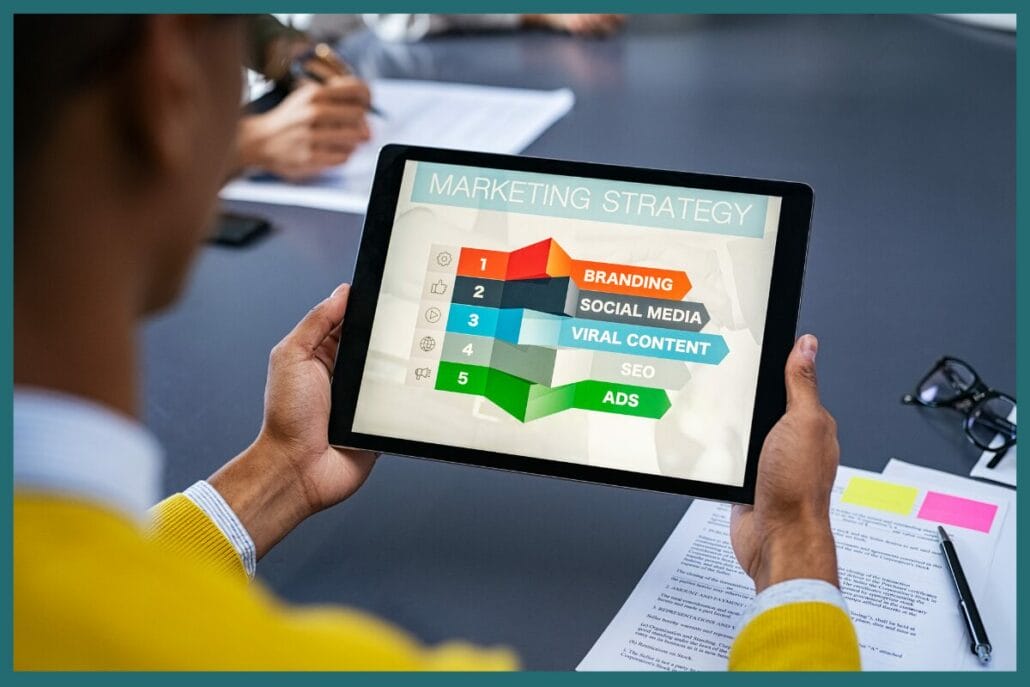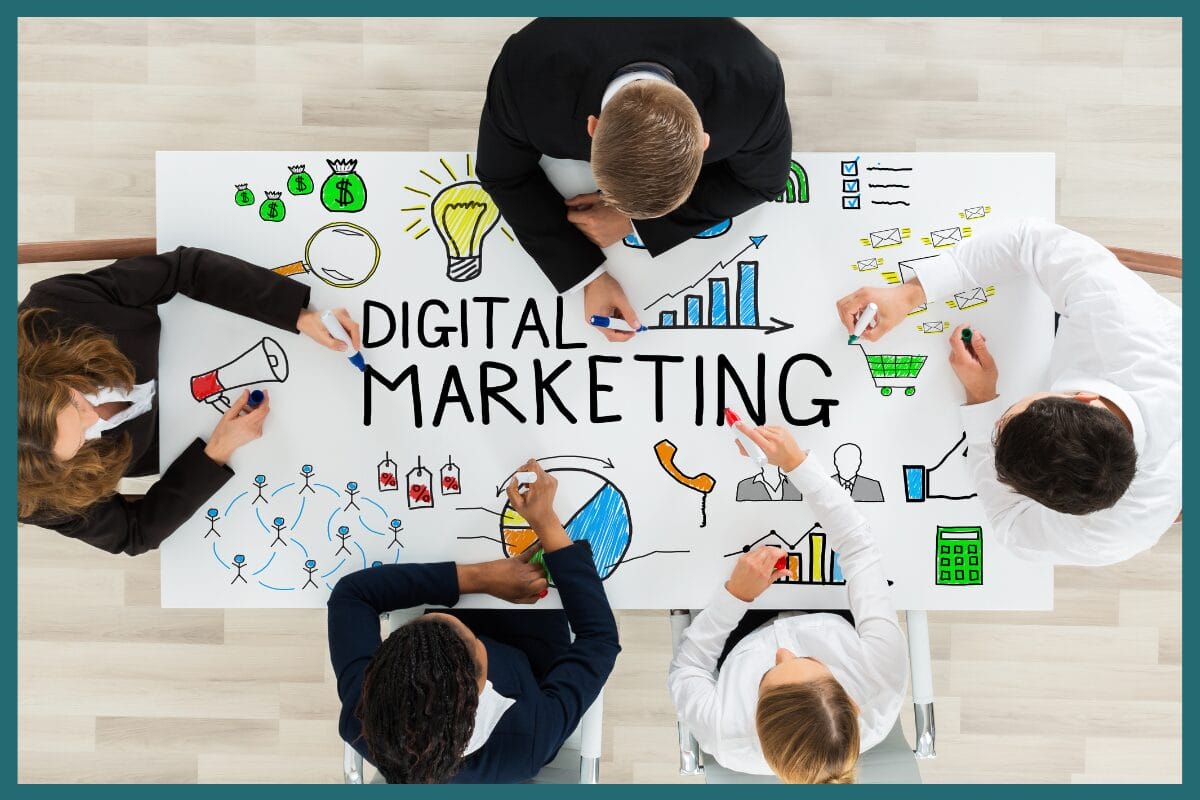Wondering what a digital marketer is? A digital marketer uses online channels to reach customers, drive traffic, and generate leads. This professional employs various digital tools and strategies to promote products or services, making it easier for businesses to connect with their audience. In this article, we’ll dive into the exciting career of digital marketing. You’ll discover the numerous roles of digital marketers, their responsibilities, and specific skills required to excel in this field.
Key Takeaways
- Digital marketers connect organizations with customers through various online channels, utilizing content creation, blog writing, web design and development, SEO, paid advertising, social media, email marketing, and other digital marketing channels to boost brand visibility and generate leads.
- Key responsibilities include creating content, creating websites, managing campaigns, analyzing data to optimize campaigns, and engaging audiences using the right content.
- The career path in digital marketing offers progression from entry-level roles to executive digital marketing positions. They require a blend of analytical, technical, and creative skills for success.
What is a Digital Marketer?

A digital marketer is a professional who uses various digital strategies and channels to connect organizations with customers online. The primary objective of digital marketing is to target specific audiences with personalized marketing messages. The messages are designed to attract customers and facilitate purchases or other conversions. The various roles involve a blend of traditional marketing techniques and modern digital tools to create effective and engaging marketing campaigns.
Digital marketers play a pivotal role in boosting brand awareness, engaging prospects, driving traffic, and generating leads. They utilize a range of channels, including search engines, social media, and websites, with a company’s website often serving as the centerpiece of its digital marketing efforts. This dynamic role requires adaptability to evolving technologies and market trends, ensuring that marketing efforts remain relevant and effective.
A digital marketer may work in-house, that is, they are directly hired by the organization that they are marketing for. They might also work for a digital marketing agency, which manages the online marketing campaigns for multiple clients. Or, they could be a freelancer, taking on digital marketing jobs independently. Depending on the company, digital marketing may also work well as a remote job.
As we delve deeper into this exciting job area, we’ll explore the core responsibilities of digital marketers and the skills they need to excel in this ever-changing field. Who knows, you may discover a career you love.
Core Responsibilities of a Digital Marketer

Digital marketers wear many hats, managing various digital marketing campaigns to enhance brand awareness and drive traffic. Their daily tasks can range from checking emails and monitoring Google Analytics to responding to social media engagement and generating reports.
Let’s break down these core responsibilities into specific areas to better understand the differnt roles.
Content Creation and Management
Content creation and management are at the heart of digital marketing. A coherent digital strategy tailored to brand objectives is crucial for reaching potential customers through engaging content. Companies often develop a content strategy that includes various formats, such as video content, to cater to diverse audience preferences.
A content marketing specialist is responsible for creating digital content and developing strategies that resonate with the company’s target audience. This includes a variety of content types, including blog articles, videos, podcasts, and social media posts. Effective content should be high-quality, unique, and valuable. The copy should engage the audience. On the website, it should generate conversions. On other platforms, it should drive traffic to the website or dedicated page on the platform. According to Forbes, 74% of companies find content marketing effective for lead generation in 2024.
Managing editorial calendars is another critical aspect of content marketing. Content marketing specialists plan upcoming content, ensuring a steady flow of engaging material. This organized approach to a content strategy helps maintain consistency and relevance in a brand’s communication with its audience.
SEO professionals enhance content effectiveness by providing valuable insights into the strategy. Content creators frequently collaborate with SEO managers to optimize content for search engines and ensure relevance. Once published, the content is marketed through social media, email marketing, SEO, or pay-per-click campaigns to maximize its reach.
- Halvorson, Kristina (Author)
- English (Publication Language)
Search Engine Optimization (SEO)
Search Engine Optimization (SEO) is a fundamental aspect of digital marketing. The primary goal of SEO is to increase website traffic and improve organic search result rankings, making it easier for potential customers to find the business online. An effective content marketing campaign significantly improves search rankings, attracting new customers.
Conducting keyword research is essential for optimizing websites and content for SEO. Creating a list of high-performing keywords and considering long-tail variations can enhance the search engine optimization strategy, even for businesses without a full-time SEO strategist. SEO techniques use online tools to find relevant keywords. The digital marketer uses the keywords to optimize content and images, and establish internal and external website links.
Combining other forms of advertising and marketing with SEO can further enhance content visibility on search engines. A higher position in organic search results increases the likelihood that target market customers visit the site as a result of searching for a specific product or service. This makes SEO an invaluable tool for digital marketers. Search engines prioritize content that resonates best with target audiences. This emphasizes the importance of creating relevant and engaging material.
Incorporating SEO, content marketing, and social media helps build organic reach in digital marketing. By leveraging these strategies, digital marketers can significantly boost a brand’s online presence and drive more traffic to their websites.
Paid Advertising
Paid advertising can go by many names: search engine marketing (SEM), PPC, Google Ads, and more. A PPC marketing campaign is a critical aspect of a comprehensive digital strategy. It involves paying a platform or seller directly when someone clicks on an ad that brings the person to the company’s website. Some of the most widely-known PPC platforms include Google Ads, Microsoft Ad Center, and Taboola or Outbrain.
At the enterprise level, paid advertising services may include digital ads for streaming platforms, display ads on national websites, and so forth. Social media marketing can also include paid advertising aspects, with the ability to run ads on Facebook, Instagram, X, Tik Tok, Pinterest, and more.
Forums can be seen as yet another platform for PPC. Reddit and Quora are two of the most popular forums today. If a company’s target market is on one or both of those platforms, it can be advantageous to market there as well.
PPC marketers create digital ads, manage campaigns, and adjust strategies based on campaign performance. Digital ads can include display ads (typically a combination of images and text), search ads (text ads), video ads (often shown on YouTube or as part of display campaigns), and audio ads.
- Cannell, Sean (Author)
- English (Publication Language)
Social Media Marketing
Social media marketing is a powerful tool for building brand awareness, establishing trust, obtaining leads, and facilitating direct marketing. Social media platforms like Instagram and Pinterest are particularly valuable for B2C companies, LinkedIn is often used to reach B2B companies, and Facebook Videos, Instagram, and TikTok are commonly used for video marketing.
A social media marketer is responsible for managing a brand’s presence across the social media platforms that their target audience uses. This includes creating content and campaigns on social platforms, establishing influencer marketing strategies, and handling customer interactions to drive website traffic. Engagement strategies include leveraging trending topics, collaborating with influencers, and utilizing social media as a high-return marketing channel.
Creating engaging content and using the right digital platforms allows social media marketers to effectively reach and engage their target audience. This strategy boosts brand visibility and fosters a loyal community of followers.
- Macarthy, Andrew (Author)
- English (Publication Language)
Email Marketing
Email marketing yet another strong component in a digital marketing strategy. Emails sent directly to target market customers aim to engage new or existing customers, provide updates, and attract new clients. Digital marketers collect names for their email lists using numerous marketing channels—from website signup forms or Facebook ads to contest signups at a conference booth. With minor details about the email’s owner, the email addresses can be segmented for the right audience persona and a highly targeted campaign.
Lead generation through email campaigns can include promotions such as discounts on products, contests, or service bundling. Effective designs often employ bold letters and colors for deals and calls to action. Well planned approaches help capture the audience’s attention and encourage them to take the desired action.
Data Analysis and Reporting
Data analysis and reporting are essential for understanding the effectiveness of a digital marketing campaign. Analyzing past campaign performance allows digital marketers to refine strategies and optimize for future success. Continuous data analysis provides valuable insight into opportunities and gaps across digital channels, leading to enhanced marketing strategies.
Key Performance Indicators (KPIs) are used for tracking campaign performance and assessing the impact of marketing initiatives. Return on investment (ROI), while sometimes difficult to assertain when it comes to branding, can be determined using the right KPIs. An analytical data-driven approach provides valuable insights into customer behavior and campaign effectiveness, enabling marketers to make informed decisions in the future.
Essential Digital Marketing Skills

Excelling in digital marketing skills requires a diverse skill set, including analytical abilities, technical proficiency, and creative thinking.
Let’s explore these essential skills in more detail.
Analytical Skills
Strong analytical skills enable digital marketers to make data-driven decisions, crucial for evaluating campaign performance and strategic adjustments. The combination of creative thinking with data-driven insights is necessary for successful digital marketing.
Leveraging data analytics tools like Google Analytics provides valuable insights into performance on digital channels, customer behavior, and campaign effectiveness. These insights enable marketers to refine strategies and optimize marketing efforts for better results.
Technical Proficiency
Technical proficiency is essential for digital marketers, as it involves familiarity with tools like Google Analytics and content management systems. Knowledge of web coding, AI, and content management systems is an asset for effective digital marketing.
Understanding how to work with these tools and gaining related certifications can significantly enhance a marketer’s skill set, making them more competitive in the job market.
Creative Thinking
Creative thinking is vital for developing engaging content and innovative strategies that capture audience attention. Digital marketers must be able to think outside the box and create content that stands out in a crowded digital landscape.
Blog writing is one of the most important SEO strategies in today’s online world. The posts need to be engaging, unique, and genuinely helpful to their target audiences. This usually means writing informational posts that help the target audience, and not simply marketing posts or those that describe digital marketing practices. Furthermore, posting 2 to 4 blog posts per week are needed for optimal SEO. As a result, creative writing roles in the digital marketing space are booming, especially if the writer has expertise in a specific area and can be considered an authority on that topic.
Note that it can be difficult to find individuals that possess creative, technical and analytical skills. As a result, these roles are often separated between different team members: some digital marketers work only on the analytics, some on technical work, and others do primarily creative work. When this structure is used, communication between the two camps is essential for success.
- Bodnar, Jacqueline (Author)
- English (Publication Language)
Challenges Faced by Digital Marketers

Digital marketers face several challenges in their field, including adapting to technological changes, balancing creativity with data, and ensuring data privacy compliance.
Let’s delve into these challenges in more detail.
Adapting to Technological Changes
The digital marketing landscape changes frequently, making it essential for marketers to stay informed about emerging technologies and trends. Rapid proliferation of digital channels and technological advancements are significant challenges faced by digital marketers.
Maintaining competitiveness requires digital marketers to adapt strategies in response to search engine algorithm changes, advancements in artificial intelligence, new features in advertising platforms, and updated data analysis tools like GA4.
Keeping up to date is almost a daily task. Digital marketers must spend part of their day staying updated on what industry leaders are saying. Some of the same platforms that digital marketers use to reach their own audiences, such as email, websites, and social media platforms, are where digital marketers learn about industry changes.
Conference attendees often receive the latest secret sauce about particular areas of expertise too. In addition to providing all-important networking opportunities with their peers, conferences can be invaluable when marketers want to set themselves apart from those who don’t know the details.
Balancing Creativity and Data
Balancing creativity with data-driven decision-making is a critical challenge for digital marketers. Marketers must create original content that stands out while using data analysis to verify appropriate strategies and ensure alignment with target audience preferences.
Successfully blending creativity with data optimization can help maximize campaign budgets and improve ROI. This balance is essential for developing an effective marketing campaign. The blend results in a successful marketing campaign that captures audience attention and drives results.
Ensuring Data Privacy Compliance
Data privacy regulations are critical for digital marketers for being in compliance and portraying trust. Marketers must navigate user privacy concerns and responsible data usage, while balancing persuasion with honesty. Compliance with regulations such as GDPR and CCPA are just a few examples.
Above all, digital marketers are required to handle customer data responsibly, ensuring that their marketing practices are ethical and transparent.
Career Progression in Digital Marketing
Digital marketing careers can progress from entry-level jobs to executive roles, with opportunities for specialization and advancement.
Let’s explore the different stages of career progression in this unique field.
Entry-Level Roles
Common entry-level positions in digital marketing include roles like Digital Marketing Assistant and Junior SEO Specialist. These roles provide foundational experience and are necessary to gain the right skills to advance in a digital marketing career.
Other starting positions include Digital Marketing Interns and Digital Account Executives, which offer hands-on experience doing various marketing tasks. Entry-level roles are essential for building a strong foundation in digital marketing.
Mid-Level Positions
Mid-level roles in digital marketing typically require knowledge of strategic business needs and encompass positions such as Digital Marketing Manager and Social Media Manager. These roles focus on strategy and leadership, often overseeing a team of specialists.
Responsibilities of mid-level positions include developing marketing strategies, providing team leadership, or taking on a specialized role such as PPC Specialist (sometimes called a Search Engine Marketing Specialist), Local Search Specialist, Marketing Analyst, or Website Designer or Developer.
Executive Roles
High-level executive roles in digital marketing, such as Chief Marketing Officer (CMO), involve strategic responsibilities and leadership over marketing initiatives in a large organization. CMOs typically require a decade of experience and are responsible for making high-level strategic decisions that shape the direction of the company’s marketing efforts.
These executive roles demand a deep understanding of both the creative and analytical aspects of of the field, as well as the ability to lead and inspire a team. They play a pivotal role in ensuring that the company’s marketing strategy aligns with its broader business goals and drives sustained growth.
How to Become a Digital Marketer

Becoming a digital marketer typically requires a solid educational foundation, with an associates degree at minimum, and bachelor’s degree as a common requirement for most positions. While a master’s degree in digital marketing isn’t essential, it can be beneficial for those looking to advance their career. Additionally, digital marketing certifications can be helpful to learn the fundamentals of the field. Certifications in SEO, social media, email marketing, content marketing, and so on can often be earned online.
Gaining practical experience through internships is invaluable for aspiring digital marketers that are still in college. Internships provide hands-on exposure to various tasks, help to build a robust skill set, create networking opportunities, and can lead to full time work. Internships offer a glimpse into the day-to-day responsibilities of digital marketing roles and can significantly enhance a candidate’s resume when entering the job market.
Newcomers to the field are advised to gain a variety of skills before specializing in a specific area of digital marketing such as social media or search engine marketing. This broad knowledge base not only makes them more versatile but also helps them identify their areas of interest and expertise. As the digital marketing landscape continues to expand, there are ample opportunities for growth and specialization in both creative and technical areas.
- Hardcover Book
- Dixon, Matthew (Author)
Salary Expectations of Digital Marketing Careers
Digital marketing roles come with a wide range of salaries, reflecting the diversity of positions and responsibilities within the field. Entry-level roles, such as Digital Marketing Assistants or Junior SEO Specialists, generally offer lower starting salaries, while mid-level positions like Digital Marketing Managers or Social Media Managers command higher pay due to their strategic and leadership responsibilities.
The average salaries for each role can vary significantly based on factors such as location, industry, and the specific skills required.
As digital marketers gain experience and advance to executive roles, their earning potential increases, with positions like Chief Marketing Officer offering some of the highest salaries in the field.
Here are some of the most common Digital Marketing Jobs, and their 2024 median annual salary (national) according to ZipRecruiter:
- Content Marketing Specialist: $59,518
- Content Marketing Manager: $77,858
- Digital Marketing Specialist $65,418
- Digital Marketing Manager: $87,719
- PPC Manager: $72,071
- Social Media Manager $64,845
- Digital Marketing Data Analyst: $91,985
- Email Marketing Specialist: $63,645
- SEO Specialist: $67,388
- Chief Marketing Officer $160,891
Summary
In summary, the role of a digital marketer is multifaceted and constantly evolving. It requires a blend of creativity, analytical skills, and technical proficiency. From content creation and SEO to social media marketing and email marketing, digital marketers play a crucial role in driving brand awareness, engagement, and lead generation.
Despite the challenges of adapting to new technologies and balancing creativity with data, a career in digital marketing offers exciting opportunities for growth and specialization. For those willing to embrace continuous learning and innovation, the digital marketing field promises a rewarding and dynamic career path.
As an Amazon Associate, The Job Blog earns from qualifying purchases. Last update on 2025-04-23 / Affiliate links / Images from Amazon Product Advertising API







